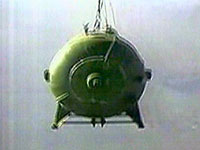USA and Europe react to Russian vacuum bomb with a polite yawn
The Russian military has successfully completed tests of the world's most powerful non-nuclear air-delivered bomb. The new ordnance, nicknamed the "dad of all bombs" is four times more powerful than the U.S. "mother of all bombs."

The tests have shown that the new air-delivered ordnance is comparable to a nuclear weapon in its efficiency and capability.
Pravda.Ru decided to interview American military experts to find out the western point of view on the subject.
Pravda.Ru: In what way can the USA and Europe react on this?
“The best way the USA and Europe can react to this is with a polite yawn. The United States in particular should not get drawn into a childish game of "mine is bigger than yours." If Russia wants to build new conventional weapons, let it -- provided, of course, they don't run afoul of international commitments,” says Andrew J. Grotto, Senior National Security Analyst at the Center for American Progress.
“New techniques make it possible for countries to develop more powerful conventional bombs. There is no treaty prohibiting these "air-fuel," or in the Russian case, "vaccuum" bombs, nor should there be,” says Joseph Cirincione, Senior Fellow and Director for Nuclear Policy at the Center for American Progress.
Pravda.Ru: Russian defense ministry stresses this military invention does not contradict a single international treaty. Is it possible that the USA or Europe will try to prevent Russia from adding the new vacuum bomb to its military arsenal?
Joseph Cirincione: The US and NATO are unlikely to object as they have similar, though smaller, bombs and these bombs have limited military utility. They are heavy and bulky and often require cargo planesa or heavy bombers for delivery. They are useful primarily against hardened target, such as fortified bunkers.
Andrew J. Grotto: I see no legal argument why Russia should not deploy the new bomb, and no reason why the United States or Europe should try and talk Russia out of deploying it. As I said, their response should be a polite yawn.
Pravda.Ru: What, do you think, are the advantages and disadvantages of this invention?
“I would not characterize myself as a weapons expert at all. The central issue is not necessarily the weapon itself, but how Russia envisions it might be employed. This would provide insight into the threats that Russia envisions it might confront in the coming decades. The West and the former Soviet Union both prepared for nuclear war and also a conventional conflict across the central plains of Europe. Fortunately, neither ever took place.
There were plenty of proxy wars in various places, but both sides ensured that they remained limited in nature. It is difficult to envision a scenario where there is open military conflict between Russia and the West. Thus, where is the utility for such a weapon? This is will be the primary focus for the United States, not the capabilities of the weapon per se. Russia certainly has every right to fully develop its military capability, but to the extent that the development of new weapons foreshadows an aggressive stance towards a neighbor such as Georgia or a province such as Chechnya, the policy behind the weapon would be a primary concern to the United States,” says P.J. Crowley, Senior Fellow and Director of Homeland Security at the Center for American Progress.
“I can certainly envision missions for a weapon like this, but I'm not a military tactician and so I can't really say too much about the operational utility of it. Mostly, I see the weapon as a political move on the part of the Russian government to stoke nationalistic sentiment within Russia -- this is about domestic Russian politics and nationalistic pride,” says Andrew J. Grotto.
Prepared by Alexander Timoshik
Pravda.ru
Subscribe to Pravda.Ru Telegram channel, Facebook, RSS!

